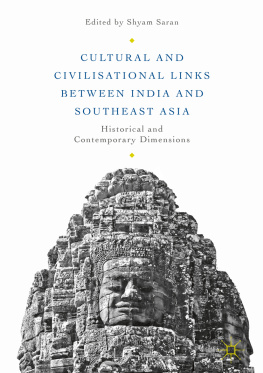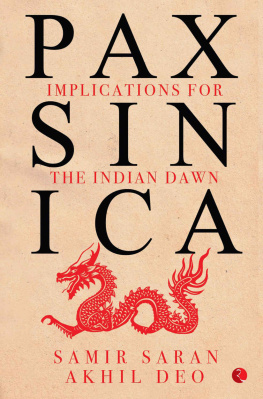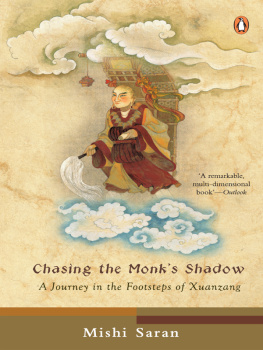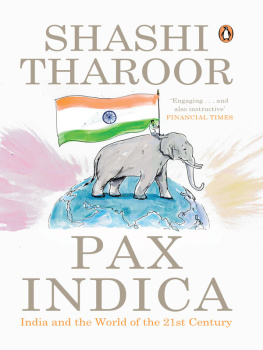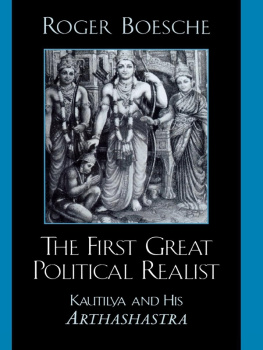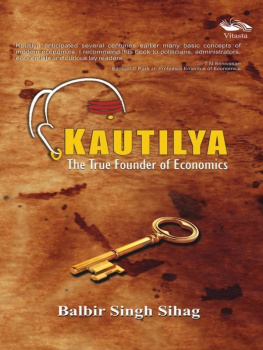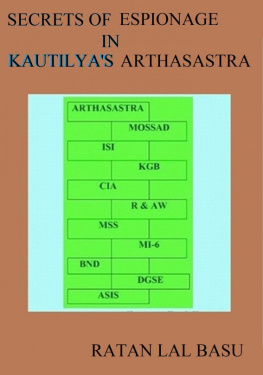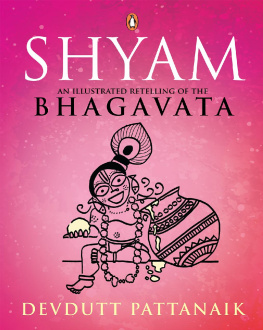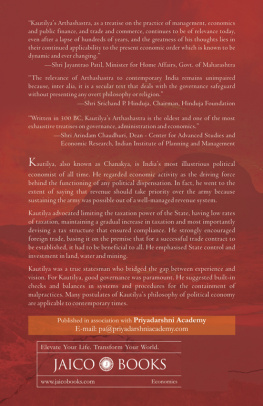Shyam Saran - How India Sees the World: Kautilya to the 21st Century
Here you can read online Shyam Saran - How India Sees the World: Kautilya to the 21st Century full text of the book (entire story) in english for free. Download pdf and epub, get meaning, cover and reviews about this ebook. year: 2019, publisher: Juggernaut, genre: Politics. Description of the work, (preface) as well as reviews are available. Best literature library LitArk.com created for fans of good reading and offers a wide selection of genres:
Romance novel
Science fiction
Adventure
Detective
Science
History
Home and family
Prose
Art
Politics
Computer
Non-fiction
Religion
Business
Children
Humor
Choose a favorite category and find really read worthwhile books. Enjoy immersion in the world of imagination, feel the emotions of the characters or learn something new for yourself, make an fascinating discovery.

- Book:How India Sees the World: Kautilya to the 21st Century
- Author:
- Publisher:Juggernaut
- Genre:
- Year:2019
- Rating:4 / 5
- Favourites:Add to favourites
- Your mark:
- 80
- 1
- 2
- 3
- 4
- 5
How India Sees the World: Kautilya to the 21st Century: summary, description and annotation
We offer to read an annotation, description, summary or preface (depends on what the author of the book "How India Sees the World: Kautilya to the 21st Century" wrote himself). If you haven't found the necessary information about the book — write in the comments, we will try to find it.
Shyam Saran: author's other books
Who wrote How India Sees the World: Kautilya to the 21st Century? Find out the surname, the name of the author of the book and a list of all author's works by series.
How India Sees the World: Kautilya to the 21st Century — read online for free the complete book (whole text) full work
Below is the text of the book, divided by pages. System saving the place of the last page read, allows you to conveniently read the book "How India Sees the World: Kautilya to the 21st Century" online for free, without having to search again every time where you left off. Put a bookmark, and you can go to the page where you finished reading at any time.
Font size:
Interval:
Bookmark:

We live in an increasingly interdependent world. Therefore, developments in the outside world can have a profound impact on the evolution of our polity as well as our economy. It is the task of our foreign policy establishment to ensure that our engagement with other countries takes place on as favourable terms as is possible, in a manner that is consistent with our national interests.
Shri Shyam Saran, who has a wealth of experience with regard to the formulation and implementation of Indian foreign policy, is highly qualified to evaluate Indias foreign policy in the post-Independence period. He considers the search for strategic autonomy the ability to take relatively autonomous decisions on matters perceived to be of vital interest to India as a running and consistent theme of our foreign policy. In this context, interestingly, Shyam Saran believes that the Indo-US nuclear deal in whose negotiation he played a very important role was significant precisely because it expanded Indias foreign policy options.
In any study of Indias foreign policy, Indias relations with other countries of the subcontinent Pakistan, Bangladesh, Nepal, Bhutan and Sri Lanka and our big neighbour China must figure prominently. I have always believed that without the normalization of our relations with these countries, India cannot realize its full developmental potential. Shyam Sarans analysis of Indias relations with China, Pakistan and Nepal is thought provoking. In his scrutiny of the issues of energy security and climate change he lays emphasis on the orderly and equitable management of globalization processes. His observations on the role of technological changes in shaping the new international order are also very educative.
Altogether, Shyam Saran has produced a book which offers a lot of food for thought and is very informative in its content. For this he is to be commended.
Dr Manmohan Singh
Former Prime Minister of India
Part history, part memoir, How India Sees the World is an illuminating and at times controversial insight into the thinking of one of Indias great diplomats and civil servants. A vigorous defender of Indias national interests, Shyam Saran offers us a unique and candid view of policy deliberations at the highest levels of the Indian government. He rightly argues for a deeper understanding of China and the historic factors which inform and shape its strategic behaviour today. Moreover, Ambassador Saran provides a timely overview of the contemporary challenges facing global politics, including but not limited to cyberspace, climate change and outer space. This is a strong contribution from a fine strategic thinker Kevin Rudd , Former Prime Minister of Australia
As an insightful, acute and erudite description of the well-springs of Indian foreign policy, Shyam Sarans How India Sees the World is unmatched. Drawing on his deep experience in crucial positions and his undoubted intellectual gifts, this book is required reading for anyone interested in Indias role in the world, and the future of Asia and the world. His familiarity with traditional Indian statecraft, and his focus on China a country he is familiar with and has studied for over forty years makes for fascinating and thought-provoking reading. A must read and an essential addition to any library on
modern India Shivshankar Menon , Former National Security Advisor of India
Arguably the most brilliant Indian diplomat in the past four decades, Shyam Sarans breathtaking command of the ancient foundations and Cold War dimensions of Indias foreign policy provides an
indispensable frame of reference for the countrys current external challenges. His discussion of the rise of Chinese power and its muscular strategic applications should be required reading for every head of government and foreign minister in the world. And his penetrating analyses of adversarial Pakistan and unpredictable America are as insightful as they are troubling. If you can only read one book on how India should conduct itself as world order fractures, read this one Robert D. Blackwill , Former US Ambassador to India and Senior Official at the White House
Drawing on his exemplary career as one of Indias shrewdest and subtlest diplomats, Shyam Sarans penetrating tract is at once strategic road map, policy handbook, and practical manual: a magnificent,
sophisticated statement of the axioms and skills that must guide us in confronting the opportunities and wicked challenges ahead as we make our way in an uncertain world Sunil Khilnani , Avantha
Professor and Director, Kings India Institute
Shyam Sarans How India Sees the World is a thoughtful reflection on the deepest well-springs of Indian foreign policy. By integrating his own rich experiences with a careful analysis of Indias strategic
circumstances, he has produced a magnificent book that interprets Indian grand strategy as a persistent struggle for autonomy characterized by a humane realism. It will be indispensable reading
for better understanding not simply Indias recent diplomatic history but also how its efforts to relate to the modern international system bear the deepest traces of its ancient and venerable ethos Ashley
J. Tellis , Tata Chair for Strategic Affairs, Carnegie Endowment for International Peace
Nowhere else but in India do religion, culture, history and recent developments come together to define a nations relations with the world. Shyam Saran is a unique guide to the long lines in Indian
foreign policy. His practical statesmanship, eye for a good story and intellectual force offer refreshing insights into India as a critical Asian and global power Erik Solheim , Executive Director, United Nations Environment Programme
We live in an increasingly interdependent world. Therefore, developments in the outside world can have a profound impact on the evolution of our polity as well as our economy. It is the task of our foreign policy establishment to ensure that our engagement with other countries takes place on as favourable terms as is possible, in a manner that is consistent with our national interests.
Shri Shyam Saran, who has a wealth of experience with regard to the formulation and implementation of Indian foreign policy, is highly qualified to evaluate Indias foreign policy in the post-Independence period. He considers the search for strategic autonomy the ability to take relatively autonomous decisions on matters perceived to be of vital interest to India as a running and consistent theme of our foreign policy. In this context, interestingly, Shyam Saran believes that the Indo-US nuclear deal in whose negotiation he played a very important role was significant precisely because it expanded Indias foreign policy options.
In any study of Indias foreign policy, Indias relations with other countries of the subcontinent Pakistan, Bangladesh, Nepal, Bhutan and Sri Lanka and our big neighbour China must figure prominently. I have always believed that without the normalization of our relations with these countries, India cannot realize its full developmental potential. Shyam Sarans analysis of Indias relations with China, Pakistan and Nepal is thought provoking. In his scrutiny of the issues of energy security and climate change he lays emphasis on the orderly and equitable management of globalization processes. His observations on the role of technological changes in shaping the new international order are also very educative.
Next pageFont size:
Interval:
Bookmark:
Similar books «How India Sees the World: Kautilya to the 21st Century»
Look at similar books to How India Sees the World: Kautilya to the 21st Century. We have selected literature similar in name and meaning in the hope of providing readers with more options to find new, interesting, not yet read works.
Discussion, reviews of the book How India Sees the World: Kautilya to the 21st Century and just readers' own opinions. Leave your comments, write what you think about the work, its meaning or the main characters. Specify what exactly you liked and what you didn't like, and why you think so.

